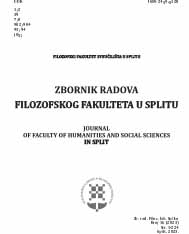KAUZALNE ATRIBUCIJE U UČENIKA ENGLESKOGA KAO INOGA JEZIKA
CAUSAL ATTRIBUTIONS AMONG SECOND LANGUAGE LEARNERS OF ENGLISH
Author(s): Leonarda Lovrović, Anna MartinovićSubject(s): Language studies, Language and Literature Studies, Foreign languages learning, Theoretical Linguistics, Higher Education
Published by: Filozofski fakultet, Sveučilište u Splitu
Keywords: Causal attributions; English second language learning; university Students; differences among learners; second language motivation;
Summary/Abstract: Expectancy value approaches in motivation research suggest that learners will engage in an activity if they expect to succeed in it. Attribution theory suggests that attributions, or perceived causes of learner outcomes, can influence the development of expectancy beliefs of future academic success among learners. Causal attributions, or the reasons to which individuals subjectively attribute their past learning success, can be considered an important second language (L2) motivational influence in the post-actional phase of language learning and may affect future action. However, few studies have focused on attributions in L2 learning, although they are included in several L2 motivation frameworks. Considering the importance of English language learning in today’s globalized world, this study focused on the causal attributions of past English L2 learning experiences of first year non-language university students in the Croatian context. Data was collected by the use of a questionnaire (The Causal Attribution Scale II – CAS-II, Sorić 2002), and was subject to descriptive and inferential statistical analyses. The results indicated that Croatian university students attributed their past English learning achievement to a stable, controllable, and internal cause, while the moderate low level on the globality scale suggested that they did not consider it to be consistent across different contexts. Contrary to many studies, no differences in attributions were found among gender. The results showed that students who had studied English longer and had higher grade levels had more stable, internal, and controllable attributions. According to Weiner (1986), when success is attributed to an internal and stable cause, there will be a greater expectancy of success, that is, an individual will be motivated to continue learning that subject. Moreover, qualitative analysis showed that effort (a controllable attribution) was the major reason attributed for students’ English achievement grade.
Journal: Zbornik radova Filozofskog fakulteta u Splitu
- Issue Year: 2023
- Issue No: 16
- Page Range: 5-25
- Page Count: 21
- Language: Croatian

